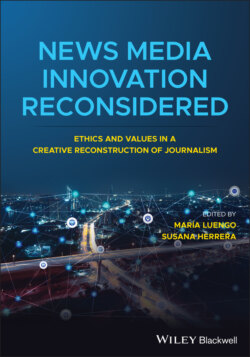Читать книгу News Media Innovation Reconsidered - Группа авторов - Страница 16
The Emergence of Journalism in the Internet
ОглавлениеBetween 1995 and 2000, thousands of newspapers and television channels worldwide launched their websites and began generating content to feed them. The initial concerns of journalists with the advent of the Internet focused on privacy, falsehood, and loss of autonomy (Deuze and Yeshua, 2001). The new medium was quickly associated with a high potential for spreading falsehoods involuntarily or deliberately. It was difficult to differentiate the truth in the Internet content, since anyone could easily replicate the credibility indicators without taking any responsibility. Many journalists feared that instant dissemination of information would undermine the processes of journalistic verification that protects them against errors and lies, so that they would be accountable for their ethical standards (Eberwein, Fengler, and Karmasin, 2019).
The value of professional autonomy also went into crisis. Journalists defended their role as “independent gatekeepers,” based on their ability to make their own judgments about what news is and, therefore, reinforce their public interest service (Suárez-Villegas and Cruz-Álvarez, 2016a). The argument was that a careful selection of news by professional gatekeepers would make it easier for citizens to receive truthful and relevant information on the issues that are supposed to be essential for democratic functioning: politics, international relations, economics, the performance of institutions and social agents, etc. However, from the beginning, the ability of users to select and access content directly was evident; journalists were losing their monopoly as providers of information in society, which caused them considerable frustration (Boczkowski, 2004).
